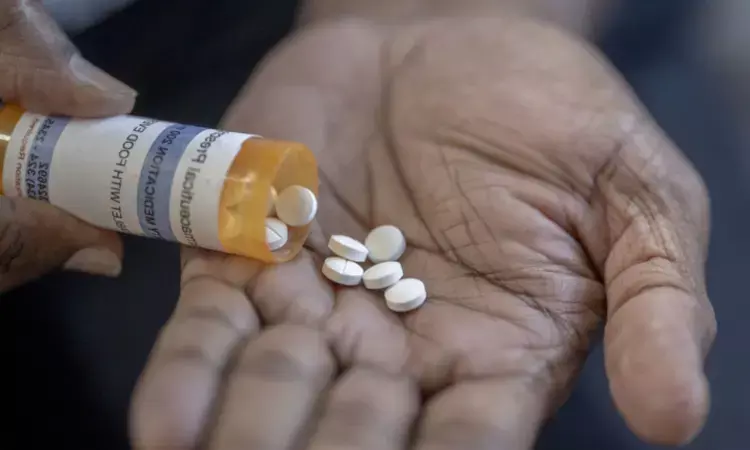- Home
- Medical news & Guidelines
- Anesthesiology
- Cardiology and CTVS
- Critical Care
- Dentistry
- Dermatology
- Diabetes and Endocrinology
- ENT
- Gastroenterology
- Medicine
- Nephrology
- Neurology
- Obstretics-Gynaecology
- Oncology
- Ophthalmology
- Orthopaedics
- Pediatrics-Neonatology
- Psychiatry
- Pulmonology
- Radiology
- Surgery
- Urology
- Laboratory Medicine
- Diet
- Nursing
- Paramedical
- Physiotherapy
- Health news
- Fact Check
- Bone Health Fact Check
- Brain Health Fact Check
- Cancer Related Fact Check
- Child Care Fact Check
- Dental and oral health fact check
- Diabetes and metabolic health fact check
- Diet and Nutrition Fact Check
- Eye and ENT Care Fact Check
- Fitness fact check
- Gut health fact check
- Heart health fact check
- Kidney health fact check
- Medical education fact check
- Men's health fact check
- Respiratory fact check
- Skin and hair care fact check
- Vaccine and Immunization fact check
- Women's health fact check
- AYUSH
- State News
- Andaman and Nicobar Islands
- Andhra Pradesh
- Arunachal Pradesh
- Assam
- Bihar
- Chandigarh
- Chattisgarh
- Dadra and Nagar Haveli
- Daman and Diu
- Delhi
- Goa
- Gujarat
- Haryana
- Himachal Pradesh
- Jammu & Kashmir
- Jharkhand
- Karnataka
- Kerala
- Ladakh
- Lakshadweep
- Madhya Pradesh
- Maharashtra
- Manipur
- Meghalaya
- Mizoram
- Nagaland
- Odisha
- Puducherry
- Punjab
- Rajasthan
- Sikkim
- Tamil Nadu
- Telangana
- Tripura
- Uttar Pradesh
- Uttrakhand
- West Bengal
- Medical Education
- Industry
Empagliflozin lowers high BP and hyperuricemia in patients with type 2 diabetes

China: Treatment with the SGLT2 inhibitor Empagliflozin is effective in controlling hypertension and hyperuricemia in diabetes patients, a systematic review and meta‐analysis has shown. The findings were published online in Diabetology & Metabolic Syndrome on 16 October 2023.
There has been a steady rise in the global prevalence of type 2 diabetes mellitus (T2DM), posing significant challenges to public health. The number of individuals with diabetes is expected to reach 552 million by 2030, leading to substantial mortality, and morbidity, and placing a burden on healthcare systems. Given these projections, it is important to identify and mitigate risk factors associated with diabetes to prevent the development of complications.
Hyperuricemia is a condition characterized by elevated serum uric acid levels and is a disorder of purine metabolism. Serum uric acid (SUA) levels tend to be higher in patients with prediabetes and type 2 diabetes compared to healthy individuals. Hyperuricemia causes a significant rate of complications and mortality through kidney and heart diseases. Therefore, reducing SUA levels in T2DM patients may potentially lower the occurrence of both minor and major complications.
Sodium–glucose Cotransporter-2 (SGLT2) inhibitors are among the anti-diabetic medicines. SGLT2 inhibitors reduce plasma glucose levels by increasing urinary glucose excretion and decreasing renal glucose reabsorption. Empagliflozin is one of the SGLT2 inhibitors, which in addition to its antidiabetic effects may also affect serum lipid and uric acid levels and kidney function.
Zhenhui Luo, Baoan Central Hospital of Shenzhen, Shenzhen, China, and colleagues aimed to investigate the effect of empagliflozin on serum uric acid levels by combining the results of the previous studies.
For this purpose, the researchers online databases to search papers until May 22, 2023. Data analysis was conducted by STATA Version 14. The meta-analysis included 12 studies comprising 7801 patients with diabetes.
The researchers reported the following findings:
- In the empagliflozin group, the serum uric acid levels of the patients decreased ([standardized mean difference (SMD): − 1.97], Systolic blood pressure (SBP) [SMD: − 2.62] and diastolic blood pressure (DBP) [SMD: − 0.49).
- Empagliflozin treatment did not affect the patients’ HbA1c levels ([SMD: − 2.85], eGFR [SMD: 0.78], creatinine [SMD:0.11], LDL [SMD: 0.14], and HDL [SMD:1.38).
- Compared with the placebo, empagliflozin was more effective in reducing uric acid levels ([SMD: − 1.34], SBP [SMD: − 2.11], and HbA1c [SMD: − 1.04]).
- Compared with sitagliptin, empagliflozin was more effective in reducing uric acid levels ([SMD: − 1], and creatinine [SMD: − 1.60]) and increasing eGFR levels [SMD: 0.99] of the patients.
- Compared with dapagliflozin, empagliflozin caused a reduction in eGFR level [SMD: − 0.45].
In patients with type 2 diabetes, empagliflozin treatment decreased blood pressure and serum uric acid levels but did not affect kidney function or glycemic control.
"Empagliflozin was more effective than placebo and some other SGLT2 inhibitors in reducing uric acid levels," the researchers wrote. "Further large randomized controlled trials are required to confirm these findings."
Reference:
You, Y., Zhao, Y., Chen, M. et al. Effects of empagliflozin on serum uric acid level of patients with type 2 diabetes mellitus: a systematic review and meta‐analysis. Diabetol Metab Syndr 15, 202 (2023). https://doi.org/10.1186/s13098-023-01182-y
Dr Kamal Kant Kohli-MBBS, DTCD- a chest specialist with more than 30 years of practice and a flair for writing clinical articles, Dr Kamal Kant Kohli joined Medical Dialogues as a Chief Editor of Medical News. Besides writing articles, as an editor, he proofreads and verifies all the medical content published on Medical Dialogues including those coming from journals, studies,medical conferences,guidelines etc. Email: drkohli@medicaldialogues.in. Contact no. 011-43720751


